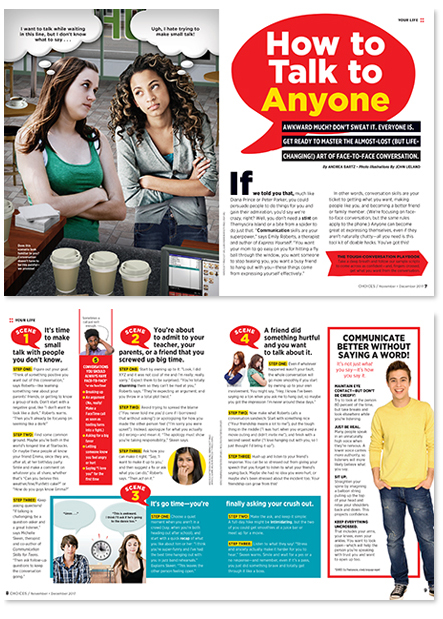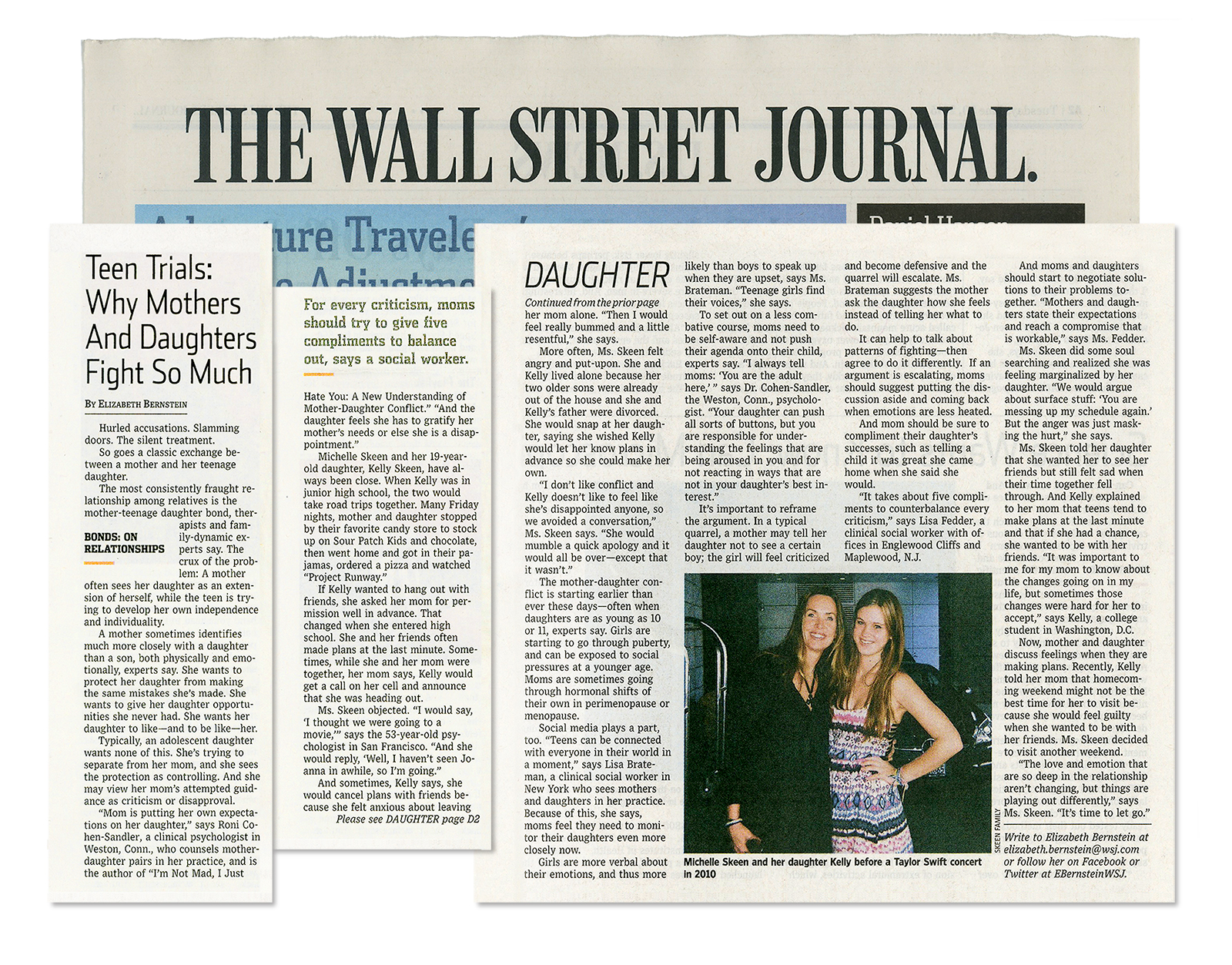As Seen In
Related Articles
A Guide to Finding Your Self Confidence and Dealing with Negative Thoughts
You NEED to read these tips.
seventeen.com
by Carolyn Twersky
If being a teen is hard, then being a teen in 2018 might just seem impossible. In the midst of self-discovery, you have to deal with Instagram likes and so many filter options. There’s a constant round of feedback these days, and it can be so hard to tune all that out enough so that you can actually listen to yourself.
With the help of Just As You Are: A Teen’s Guide to Self-Acceptance and Lasting Self-Esteem, a book co-authored by psychologist and mom Michelle Skeen and her teen daughter Kelly, we will look at why self-esteem can sometimes feel like an uphill battle and what you can do to become more confident.
Here’s how you can boost your self-esteem…
You’re Not Alone
Let’s get one thing straight: You are def not alone when it comes to having negative feelings about yourself sometimes, especially if you’re a girl. Why? Because society has turned female self-worth into a consumerist power play, where women are meant to feel like they’re less than so that are inspired to purchase things in order to feel good enough, thus fueling a lot of big businesses.
Another thing that can make matters worse when it comes to self-esteem is social media. In this world of comparison, where everyone’s lives are well-curated and on display, it’s easy to assume everyone, but you, is perfectly confident. “This can result in feeling that you are flawed—not as perfect as other people might seem,” says Michelle. “When these feelings get repeatedly reinforced overtime, it can lead to shame, depression, anxiety, and isolation.”
And this is something that so many teens experience. Even the girl with ALL the likes will sometimes feel like she’s not worthy, because self-worth comes from the inside (and no amount of comments can really change what the inside of your heart looks like). Confidence takes work for EVERYONE, and you can totally get there if you try.
Science Plays a Role, Too
A lot of things can feel stressful when you’re a teen, and sometimes it’s not just circumstantial. Even science plays into how you’re feeling about yourself. “Teens are primarily ruled by their amygdala (the emotional part of the brain), while the rational part of the brain (the prefrontal cortex) is still developing,” Michelle says. This can make logically NBD situations feel really intense and upsetting.
Know What’s Really Making You Feel Bad
So how can you get your brain out of the way so that you can live your best *confident* life? The key is figuring out what makes you feel bad about yourself and learning how to minimize those negative situations.
For example, maybe you feel bad after hanging out with a particular group of friends. Think back to your most recent hang. Did anything happen that made you suddenly feel off? Maybe you noticed one friend low-key shading you, or there’s a chance your bestie talks about losing weight a lot and it makes you feel uncomfortable about your own body.
If you value the friendship with the person who seems to be bringing up negative feelings, try to chat with them about it. Maybe they’re in a confidence funk, too, and you’ll be just what they need to do a little internal work to feel better about themselves.
If the friendship has gotten too toxic, it also might be worth putting the squad on ice and spending a little more time with other friends or hanging out solo.
Figure Out Your Values
According to Just As You Are, feeling more confident is “an inside job.” Instagram likes won’t actually build you up from the inside out. Instead, what you really need to focus on is “what matters to you and how you want to be seen.”
In order to do this, you need to identify your values. If you’re not sure what your morals are, ask yourself questions like:
- What is a trait that I respect most in other people?
- What is a turn-off in a crush or best friend?
- What is a quality that I want to be able to identify in myself?
- Who do I admire and why?
The answers to these questions will help you create a list of things you value (and odds are you respect your bestie’s intelligence over her IG game). Now that you know the traits you truly strive for, try to work towards them. If you admire a crush because of their powerful presence, go outside your comfort zone with an extracurricular activity (maybe theater?) so you can identify and hone that quality in yourself.
Be Mindful
Have you ever been in bed, trying to fall asleep and all of the sudden your brain is like: Hey, remember that really awkward thing you did on July 1, 2011? Bam, you can no longer sleep; all you can do is think about that awful moment that was years ago.
Obviously, you can’t help it when those negative thoughts pop into your head, but “by attaching to our negative beliefs and the resulting thoughts, we come to believe that they define who we are at our core,” according to Just As You Are. “In turn, our inner self is expressed through our outer self.” And this practice can be really toxic.
To combat those thoughts that keep you up at night, try your hand at mindfulness, or “the basic human ability to be fully present, aware of where we are and what we’re doing,” according to Mindful.org.
To gain control over negative thoughts, you need to get some distance from them. In Just As You Are, Michelle walks you through an exercise to help with this process…
Take a few minutes and write down the thoughts in your head. Then, go through these thoughts, looking for patterns, really dissecting them. Do they mostly have to do with the future? Do they all involve school work? Do they revolve around social situations?Taking these thoughts out of your head and putting them on paper allows you to look at them in a different light and helps you understand more of where they come from, what they’re focused on and what they mean. Then, you can begin focusing in on a specific issue. For example, if all your negative thoughts pertain to the future, try making a one year plan to organize the thoughts and up your confidence regarding the upcoming months.
Really Listen
Sometimes you’re your own worst enemy. Case in point: You ask your bestie to critique your class presentation, so she tells you that you spoke a little fast, but that all of the information you said was really well-put and interesting. As your own biggest critic, “you will likely latch on to comments that confirm your negative beliefs about yourself,” according to Michelle. And you’ll miss all the good stuff your bestie is saying about you!
In order to avoid this, try to be an active listener and truly pick up on everything, not just the aspects that confirm the negative thoughts you have in your head. It’s easier said than done, but with practice, it can be achieved.
Everyone struggles with self-esteem issues. Some deal with it every day, while others find those bad thoughts creeping up every once in a while. Whatever the case may be, it’s important to realize that you can gain control over your self-confidence.
For more tips like the ones above, check out Just As You Are: A Teen’s Guide to Self-Acceptance and Lasting Self-Esteem.
Read it on seventeen.com
Does Social Media Feed Your Feelings of Unworthiness?
New Harbinger Blog • July 18, 2018
By Kelly Skeen and Michelle Skeen, PsyD, authors of Just As You Are
How many times have you looked at your phone today? 10? 20? 30? 40? If you’re an average tween or teen you’ve looked at your phone 46 times. And, you’ve spent a third of your day using media—Instagram, Facebook, online videos, and music. Maybe you do it without thinking.
Have you ever thought about how all of these images are impacting your beliefs about yourself and others? It’s likely that, knowingly or unknowingly, you are comparing yourself to the images you see on your feeds every day. All of us struggle with some aspect of ourselves. This feeling is reinforced and likely made worse by social media and the constant and ever-changing messages you receive about what you need to do, to look like, and to act like in order to be accepted. It can leave you feeling like you need to hide parts of yourself that aren’t perfect and/or don’t fit within the norm. This by itself feels like a setup for failure.
As you might imagine, your beliefs about yourself are a mixed bag. You probably hold some beliefs about yourself that are positive. Maybe you make friends easily, you have great hair, you are close with your siblings, you excel academically, you’re good at sports, and so on. But you also likely have beliefs about yourself that are negative. In fact, this might mean that you are hiding parts of yourself because you fear being judged, not accepted, or both. You may feel that you are outside of the norm in some way. There might even be aspects of your identity that you have no control over or you don’t like—such as your ethnicity, religion, family, culture, height, eye color, body type…you get the point.
Of course, there is even more of your life that is out of your control, because you have parental figures who control parts of your life that you have little or no say about—where you live, what school you attend, activities you are or are not allowed to participate in, who you can be friends with, who you can date—the list goes on. There’s a good chance that you feel inadequate, flawed, or not good enough as a result of some of these factors.
Every teenager (even the ones that seem perfect!) struggles with feelings of inadequacy, defectiveness, and unworthiness. This impacts your feelings of self-worth, which might be holding you back or getting in the way of satisfying peer interactions and acceptance. Like most people, you care what other people think of you, and you probably spend at least some time comparing yourself to your peers. Social media feeds our natural tendency to compare how we measure up to others. This can result in feeling that you are flawed—not as perfect as other people might seem. When these feelings get repeatedly reinforced over time, it can lead to shame, depression, anxiety, and isolation.
We are all wired to connect with others, and when we do make healthy connections, we thrive. So it makes sense that we would want to be accepted by others, and we would fear being found not good enough and rejected. In fact, you may go to great lengths to avoid judgment or rejection from others. This might include seeking affirmation from others, being unable or unwilling to make decisions without approval from others, or having difficulty hearing even mild criticism.
You may find it difficult to accept and share parts of yourself that are out of your control, or you may feel like you need to be a certain way to be liked and accepted by others. Or you may focus more of your energy on others to distract them from the ways in which you feel insufficient. You may already be thinking about the parts of yourself that make you feel less than, or that you hide from others because you fear the response you might receive. And you might even be aware of the ways this holds you back from realizing your full potential or building the relationships that you long for.
The truth is that you don’t have to keep hiding from others or comparing yourself to others. You are beautiful and perfect just as you are.
Lifelong struggles with feelings of unworthiness and inferiority begin with beliefs formed when we’re teenagers. Just As You Are empowers teens to identify and eliminate these beliefs now, before they take root and cause problems like depression, addiction, and failed relationships in adulthood.
Read it on New Harbinger Blog
How to Talk to Anyone: Choices by Andrea Bartz
Click image to enlarge

Kelly and Michelle were featured in “Teen Trials: Why Mothers and Daughters Fight So Much” by Elizabeth Bernstein.
Click lower image to enlarge

